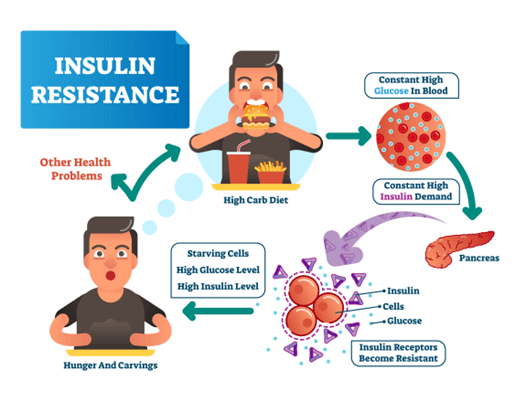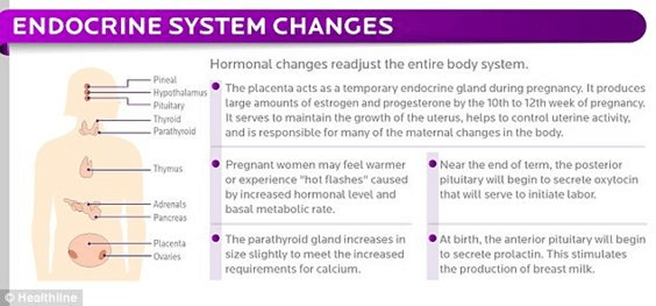Endocrine Changes in pregnancy
- The endocrine system undergoes significant changes to regulate the metabolic, reproductive, and immunological functions of pregnancy
- The main endocrine changes include:
- Increased human chorionic gonadotropin (hCG): The hormone produced by the placenta that maintains the corpus luteum (the structure that produces progesterone) and stimulates fetal growth increases during pregnancy. The hCG levels peak at 8 to 10 weeks of gestation and then decline until term. The normal range of hCG in pregnancy is based on the gestational age and varies widely among individuals.
- Increased progesterone: The hormone produced by the corpus luteum and then by the placenta that maintains the endometrium (the lining of the uterus), inhibits uterine contractions, and prepares the breasts for lactation increases during pregnancy. The progesterone levels rise steadily throughout pregnancy and reach their highest point at term. The normal range of progesterone in pregnancy is based on the gestational age and varies widely among individuals.
- Increased estrogen: The hormone produced by the ovaries and then by the placenta that stimulates uterine growth, increases blood flow to the uterus and breasts, and enhances fetal organ development increases during pregnancy. The estrogen levels rise steadily throughout pregnancy and reach their highest point at term. The normal range of estrogen in pregnancy is based on the gestational age and varies widely among individuals.
- Increased thyroid hormones: The hormones produced by the thyroid gland that regulates the metabolic rate, protein synthesis, and fetal brain development increase during pregnancy. The thyroid hormones increase by 50% to 100% during pregnancy due to increased hCG levels, increased estrogen levels, and increased thyroid-binding globulin (the protein that carries thyroid hormones in the blood). The normal range of thyroid hormones in pregnancy is based on the gestational age and varies widely among individuals.
- Increased insulin resistance: The reduced ability of the body to respond to insulin (the hormone that lowers blood glucose levels) increases during pregnancy. This is due to increased placental hormones such as human placental lactogen (hPL), cortisol, and progesterone that antagonize the action of insulin. The insulin resistance increases progressively throughout pregnancy and reaches its highest point at term. The normal range of insulin resistance in pregnancy is based on the individual’s pre-pregnancy glucose tolerance and varies widely among individuals.

- Increased prolactin: The hormone produced by the pituitary gland that stimulates milk production and inhibits ovulation increases during pregnancy. The prolactin levels increase by 10-fold to 20-fold during pregnancy due to increased estrogen levels and suckling stimulation. The normal range of prolactin in pregnancy is based on the gestational age and varies widely among individuals.
- The endocrine changes may cause symptoms such as fatigue, mood swings, breast tenderness, or polyuria (increased urination) that are normal or abnormal depending on the severity, duration, and frequency
- The endocrine changes result in increased hormonal feedback (the process by which hormones regulate their own secretion or the secretion of other hormones) and decreased hypothalamic-pituitary-ovarian axis (the system that controls the reproductive function) that regulate the metabolic, reproductive, and immunological functions of pregnancy
- The endocrine changes may cause symptoms such as fatigue, mood swings, breast tenderness, or polyuria (increased urination) that are normal or abnormal depending on the severity, duration, and frequency

Nursing Test Bank
Quiz #1: RN Exams Pharmacology Exams
Quiz #2: RN Exams Medical-Surgical Exams
Quiz #3: RN Exams Fundamentals Exams
Quiz #4: RN Exams Maternal-Newborn Exams
Quiz #5: RN Exams Anatomy and Physiology Exams
Quiz #6: RN Exams Obstetrics and Pediatrics Exams
Quiz #7: RN Exams Fluid and Electrolytes Exams
Quiz #8: RN Exams Community Health Exams
Quiz #9: RN Exams Promoting Health across the lifespan Exams
Quiz #10: RN Exams Multidimensional care Exams
Naxlex Comprehensive Predictor Exams
Quiz #1: Naxlex RN Comprehensive online practice 2019 B with NGN
Quiz #2: Naxlex RN Comprehensive Predictor 2023
Quiz #3: Naxlex RN Comprehensive Predictor 2023 Exit Exam A
Quiz #4: Naxlex HESI Exit LPN Exam
Quiz #5: Naxlex PN Comprehensive Predictor PN 2020
Quiz #6: Naxlex VATI PN Comprehensive Predictor 2020
Quiz #8: Naxlex PN Comprehensive Predictor 2023 - Exam 1
Quiz #10: Naxlex HESI PN Exit exam
Quiz #11: Naxlex HESI PN EXIT Exam 2
Questions on Endocrine Changes in pregnancy
Correct Answer is A
Explanation
No explanation
Correct Answer is A
Explanation
hCG does not regulate the metabolic rate.
That is the role of another hormone called thyroid-stimulating hormone (TSH)
Increased thyroid hormone levels do not cause increased urination and fatigue. Thyroid hormones are responsible for regulating the metabolism, growth and development of the body.
They do not affect blood glucose levels or insulin sensitivity.
No explanation
Search Here
Related Topics
- Hypoglycemia - Physiological And Physical Changes In Pregnancy
- Preterm birth - Physiological And Physical Changes In Pregnancy
- Macrosomia - Physiological And Physical Changes In Pregnancy
- Post-term birth - Physiological And Physical Changes In Pregnancy
- Hyperbilirubinemia - Physiological And Physical Changes In Pregnancy
- Cardiovascular Changes in Pregnancy - Physiological And Physical Changes In Pregnancy
More on Nursing
Free Nursing Study Materials
Access to all study guides and practice questions for nursing for free.
- Free Nursing Study Trials
- Free Nursing Video tutorials
- Free Nursing Practice Tests
- Free Exam and Study Modes
- Free Nursing Revision Quizlets
